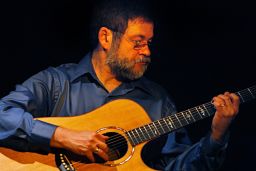Editor’s Note: Alex Lubet is a professor of music at the University of Minnesota. Steven Lubet is a professor of law at Northwestern University. The views expressed in this commentary are their own.
Even people who don’t care much about royal weddings were impressed by the way Prince Harry and Meghan Markle integrated Anglo-African and African-American elements into their wedding ceremony.
Far from glossing over Markle’s biracial heritage, the couple made a point of involving Rev. Michael Curry, the first African-American presiding bishop of the Episcopal Church, as well as cellist Sheku Kanneh-Mason, the first black performer to be named Britain’s Young Musician of the Year and a member of what Simon Cowell calls “the most talented family in the world.”


Then there was the gospel choir. As Salamishah Tillet described it in the New York Times, the “awesome power” of southeast London’s Kingdom Choir “showcased the sheer breadth of a trans-Atlantic black identity” in its “rollicking rendition of Ben E. King’s ‘Stand by Me.’”
She was right in her appreciation of the group’s performance, which moved all wedding attendees. But there is a backstory to the song that makes it even more appropriate for such an inclusive occasion. It was the product of one of the celebrated cradles of American popular music, a place where artists from different backgrounds collaborated in the creation of a now classic sound.
Tillet refers to “Stand by Me” as representative of the “African-American songbook,” and, of course, it was first released and made famous by Ben E. King in 1961. King shared the credits, however, with Jerry Leiber and Mike Stoller, two songwriters working in New York City’s Brill Building.
Like most of the writers and producers in that legendary music industry mecca, Leiber and Stoller were Jewish, while many of the vocalists were black. Leiber and Stoller had already written several hits for King’s previous group, The Drifters, and, by 1960, they were working with him to develop his solo career. (Most of Leiber and Stoller’s songs were written for black artists, but they had also written hits for Elvis Presley and even Perry Como.)
The team had just finished recording “Spanish Harlem,” which would become King’s breakout success, and they used their remaining studio time to explore other possible recordings. King already had some lyrics in mind and the beginning of a tune, apparently based on an earlier “Stand by Me” (sometimes known as “Stand by Me Father”) by Rev. Dr. Charles Albert Tindley, the African-American “Prince of Preachers.”
Leiber and Stoller worked with King to fill out the melody and complete the lyrics, with Stoller adding the signature bass line at the beginning of the song. They would divide the royalties equally, with half going to King, and half shared by Leiber and Stoller.
Fittingly reflecting both the Christian and Jewish backgrounds of the composers, the lyrics to “Stand by Me” are clearly derived from Psalm 46 of the Hebrew scripture, by way of Tindley, a Methodist minister. As King, Leiber and Stoller memorably wrote it:
When the night has come
And the land is dark
And the moon is the only light we’ll see
No I won’t be afraid, No I won’t be afraid
Just as long as you stand, stand by me
If the sky that we look upon
Should tumble and fall
Or the mountains should crumble to the sea
I won’t cry, I won’t cry
No I won’t shed a tear
Just as long as you stand, stand by me
Whenever you’re in trouble, won’t you stand by me
Oh stand by me,
Oh won’t you stand now?
Stand by me
And here is the beginning of the Bible Psalm:
God is our refuge and strength, a very present help in trouble.
Therefore will not we fear, though the earth be removed, and though the mountains be carried into the midst of the sea;
Though the waters thereof roar and be troubled, though the mountains shake with the swelling thereof.
In other words, “Stand by Me” embodies the very best of the American tradition, with artists from different backgrounds working together to create something uniquely wonderful and enduring.
It is hardly surprising that the song has been recorded by artists as diverse as Jimmy Ruffin, John Lennon and Mickey Gilley. There was even a spoken-word version by Muhammad Ali. It’s no doubt been played at countless weddings for couples of nearly every conceivable origin and upbringing.
After “Stand by Me,” King went on to crossover success, while Leiber and Stoller wrote a series of hits in multiple genres, including pop, R&B, country and rock. At a time when we increasingly hear complaints about “cultural appropriation,” we would all do well to remember the virtue of cross-cultural collaboration, which can bring us great art.
And, as the world has learned from the new Duke and Duchess of Sussex, it can also be the source of great romance.

